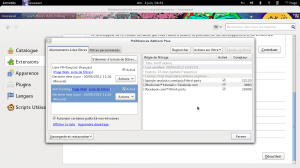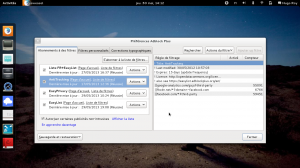At last, privacy is becoming a hot issue, in a world where everyone is tracked by companies and by the State, and in which information is shared more easily through networks. We can now potentially share everything with the whole world in an instant. The Internet is now accessible by almost every mobile phone.
Obviously, the consequences are huge, not only technically, but also on our behaviour. Social practices evolve with technologies, so is our conception of privacy. We are now willing to show more, to publish more. For my generation, it seems like the complex of privacy or intimacy is now gone.
Or, is it?
Maybe not. Because in spite of all these practices of sharing almost everything on the Web, recently the issue of privacy has risen. Politicians in France came up with a “right to oblivion” which consists in allowing everyone a kind of absolute “property” on everything that is published by (or about) you on the Web.
But very recently, Facebook’s founder Mark Zuckerberg claimed:
“The Age of Privacy is Over”
ReadWriteWeb
This echoes the changes in privacy settings and privacy policy that Facebook has undertaken in December, for which a lot of people are complaining. They are now concerned about the respect of their privacy, after having published so much things.
It’s not that I’m particularly enjoying this trend towards less privacy and more publicity, I am myself a hardcore advocate of privacy (which is the reason why I use encryption for my emails and do not use Gmail). But however, I am really welcoming this change in the Facebook policy. Here’s why.
Let’s have a look at what happened. In the beginning of December, Facebook updated the privacy settings with new default options which were seen as less “protective with privacy.” Since a lot of people are using the default options, a lof of things published, which were intended to be accessible only to a restrictive list of people, called “friends;” suddenly went more public. Even Mark Zuckerberg’s pictures were then publicly available (and it was certainly not a mistake).
So how did we get there? What explains this strategic change at Facebook?
The first mistake was to even consider in the first place that there is such thing as privacy on Facebook.
Facebook is about sharing. The only major difference in its concept compared to other services like YouTube is that the sharing is not focused on content (YouTube is focused on videos), but it is focused on individuals. The way streams are organized is not as much on what is said, as to whom and by whom it is said.
Nevertheless that does not change the fact that whatever is shared, is public. It maybe to a restrictive audience in the first place, but it is public, especially when you have more than 50 “friends” (which is the case for almost everybody). So from there, I find it’s particularly incoherent to concern about privacy, because such a privacy is illusion and in contradiction with Facebook’s utility.
The argument that there was a kind of implicit agreement between Facebook and its users that what is published should be kept private is pure nonsense. It is true that in the beginning Facebook was only for students and so it was a restrictive enough network. But it is a long time since Facebook is not a Harvard community anymore. It’s now a worldwide company.
And like every company of this size, you do not control it, you do not own it. Behind, there are commercial incentives, and certainly not poeple without ulterior motives… People who used to think Facebook was compatible with privacy were wrong.
Because technically privacy needs certain rules and practices to be protected. Think of the issue of private communication (snail mails, emails, instant messaging). Why do you use an envelop when you send a letter? This is a technical measure you take in order to protect your own privacy.
On the Internet, we also have laws to protect privacy (or at least we try). The problem is that everyone forgot to take care of their own privacy. Why is almost nobody using encryption when sending an email?
On Facebook, such precautions cannot exist because you would not control them. And even when you think you are in control of your data, you are not. Because all your data are in their databases. You cannot trust them on that. You have no means to make sure that your privacy is respected. Moreover, it is nonsense to give up the respect of your privacy to others, even more to a business that is based on advertisement and marketing your data.
If you go on with trying to keep things private on Facebook, you will end up with problems every single time they change something. And since they don’t have a very strong business model right now, it is likely to change again. My feeling on this is that Facebook needs to be more open and tends to look like Twitter: more public, more audience, more information, more sharing… more advertisement.
My advice is that you should always keep in mind: everything you publish on the Internet will be public, especially when you don’t control your publication with your own trusted server. And whatever concerns your intimacy should not be on the public Web. You don’t need the Web to share your photos with true friends, you have emails or instant messaging (e.g. jabber).
Finally, if you want to enjoy social networks you have to accept the way it works. Like everything social, it can be the subject of social studies, or economic interests, or marketing. And what is social on the Web belongs to the public sphere. Your privacy does not belong to the public sphere. Accept that, and publish whatever you want with maximum openness and you will see how much you will enjoy websites like Facebook without being worried for your privacy.
This was previously published in French on my personal weblog.



